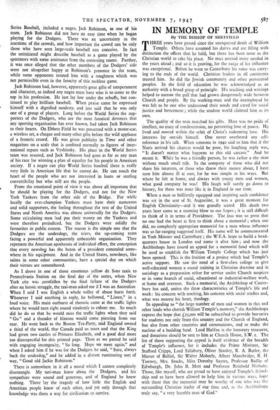IN MEMORY OF TEMPLE
By THE BISHOP OF SHEFFIELD
THREE years have passed since the unexpected death of William Temple. Others have assumed his duties and are filling with distinction the offices that he held, but there has been none in the Christian world to take his place. No magi seemed more needed in the years ahead ; and so it is proving, for the range of his influence was exceptional. Before he went to Canterbury his voice was carry- ing to the ends of the world. Christian leaders in all continents trusted him. So did the Jewish community and other persecuted peoples. In the field of education he was acknowledged as an authority with a broad grasp of principle. His teaching and writings helped to narrow the gulf that had grown dangerously wide between Church and people. By the working-man and the unemployed he was felt to be one who understood their needs and cared for social justice and betterment ; while the student world claimed him as its own.
The quality of the man matched his gifts. Here was no pride of intellect, no trace of condescension, no perverting love of power. He lived and moved within the orbit of Christ's redeeming love. His interests lay outside himself. One never overheard any self- reference in his talk. When someone in 1940 said to him that if the Nazis arrived his chances would be poor, his laughing reply was, " It doesn't matter what happens to this old carcase." And he meant it. While he was a friendly person, he was rather a shy man without much small talk. In the company of those who did not share his interests, or those who threw their money about, I have seen him almost ill at ease, for he was simple in his ways. But where he felt at home, and always with young men and women, what good company he was! His laugh will surely go down to history, for there was none like it in England in our time.
When a man so brilliantly equipped and inspiring such confidence was set in the seat of St. Augustine, it was a great moment for English Christianity—and it was grandly seized. His death two years later came as a stunning blow to our hopes ; it is still difficult to think of it in terms of Providence. The loss was so great that no one had the heart at first to think about a memorial ; when one did, no completely appropriate memorial for a man whose influence was so far-ranging suggested itself. His name will be commemorated in York Minster and Canterbury ; the W.E.A. hope to build a head- quarters house in London and name it after him ; and now the Archbishops have issued an appeal for a memorial fund which will be used to establish the William Temple College which has just been opened. This is the fruition of a project which had Temple's active support. He saw the need of a first-class college to give well-educated women a sound training in Christian doctrine and in sociology as a preparation either for service under Church auspices or in some branch of social, educational or industrial-welfare work, at home and overseas. Such a memorial, the Archbishop of Canter- bury has said, unites the three characteristics of Temple's life and work: his concern with teaching, his concern with social studies and, what was nearest his heart, theology.
In appealing to " the large number of men and women in this and other lands who cherish William Temple's memory," the Archbishops express the hope that £25,000 will be subscribed to provide bursaries for students not only from this country and the Church of England, but also from other countries and communions, and to make the nucleus of a building fund. Lord Halifax is the honorary treasurer, and donations should be sent to him at Church House, S.W. r. The list of those supporting the appeal is itself evidence of the breadth of Temple's influence, for it includes the Prime Minister, Sir Stafford Cripps, Lord Salisbury, Oliver Stanley, R. A. Butler, the Master of Balliol, Sir Walter Moberly, Albert Mansbridge, R. H. Tawney, Mrs. Stocks, Miss Dorothy Sayers, Professor Baillie of Edinburgh, Dr. John R. Mott and Professor Reinhold Niebuhr. Those, like myself, who are proud to have enjoyed Temple's friend- ship and to have been allowed to help him in various ways, hope with them that the memorial may be worthy of one who was the outstanding Christian leader of our time and, as the Archbishops truly say, "a very humble man of God."


































 Previous page
Previous page